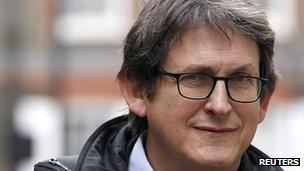Leveson Inquiry: PCC investigation 'was whitewash'
- Published

Mr Rusbridger said the hacking scandal had been sobering for the industry
The Press Complaints Commission's investigation into phone hacking was "worse than a whitewash," Guardian editor Alan Rusbridger has said.
He told the Leveson Inquiry into press ethics that the watchdog's "inadequate approach undermined the principle of self-regulation".
Mr Rusbridger also said he was not opposed to giving a new regulator its powers in law.
Earlier, Private Eye editor Ian Hislop said new laws were not needed.
The PCC's inadequacies were exposed when it investigated claims of phone hacking at the News of the World, Mr Rusbridger said.
The commission was established in 1991 to enforce a code of practice for UK newspaper and magazine publishers and editors. It has been widely criticised for its handling of the NoW scandal.
Mr Rusbridger said: "It could have done a better job than it did with the powers it had, even when they were lied to by biggest media player, the most prominent member," he said.
He called for a Press Standards and Mediations Commission with an adjudication wing, so people would not have to use the law to address issues with newspapers.
Mr Rusbridger said he "wouldn't be against the use of statute", if a new regulator could enforce its powers to deal with early-stage libel complaints.
But he added: "We utterly reject anything that looks like state licensing and we reject anything that looks like politicians or the state having any kind of say in the content of newspapers."
Deleted voicemails
On the impact of the hacking scandal he said: "There isn't a journalist in Britain who hasn't found this sobering. No industry could enjoy it, it's a harsh and uncomfortable light. The inquiry fits with the transparency we expect from others. Voices are being engaged that wouldn't have happened six months or year ago."
Meanwhile, the question of how Milly Dowler's voicemails came to be deleted is not a "primary issue" for the inquiry, Mr Rusbridger said.
The allegation that NoW journalists deleted the messages first appeared in the Guardian and was a turning point in the hacking affair. But lawyers for the Metropolitan Police later said it was "most likely" the messages were deleted automatically.
"To some extent it's a siding. I think there were people who are trying to elevate this into a primary issue now who didn't think that it was at the time," Mr Rusbridger told the inquiry.
"I think when you trace back the reasons that were given for the closure of the News of the World at the time, they certainly weren't that."
Earlier, the Sunday Times editor confirmed the paper "blagged" information from the Abbey National by pretending to be former prime minister Gordon Brown on the phone.
John Witherow said it was part of an investigation in 2000 into his purchase of a flat from a company owned by the former Mirror owner Robert Maxwell.
The paper has argued that the story was in the public interest and that this would provide a defence to any charges brought under the Data Protection Act for accessing personal details, the Leveson Inquiry heard.